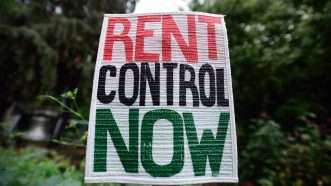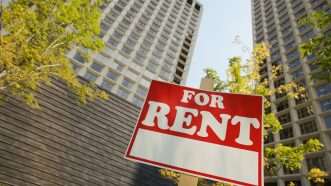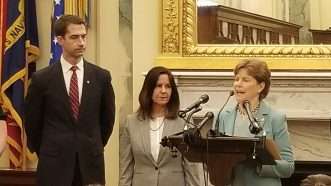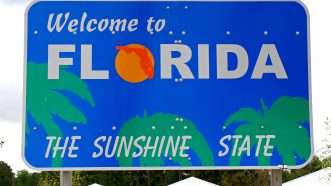Policy
How to Make Bar Exams Great Again
Bar exams should be abolished. But if that's not feasible, this modest proposal for exam reform should help restore them to their former glory!
After 6-Year Fight, Florida Couple Wins Right to Grow Veggies at Home
Local governments can't outlaw home vegetable gardens under a new Florida law.
California Politicians Want More Federal Money to Keep Doing a Terrible Job With Homelessness
Los Angeles Mayor Eric Garcetti doesn't like President Donald Trump's insults, but does want more money from his administration.
Pennsylvania Opens Up to Workers From Other States
Gov. Tom Wolf just signed a bill to recognize occupational licenses obtained in different parts of the country.
Oregon Becomes First State to Ditch Single-Family Zoning
State lawmakers end the legislative sessions by passing a bill that will allow for denser housing construction across the state.
Democratic Debate Opens by Declaring Big Tech and Corporations as the Enemy
Bill de Blasio: "We are supposed to break up big corporations when they're not serving our democracy."
The YIMBY Movement Has Made it to D.C. Republicans Are Leading the Way.
Proposals from the White House and Sen. Todd Young highlight the role regulation plays in raising housing costs.
The Supreme Court Says Your Filthy Trademark Is Protected by the First Amendment
A 6-3 ruling says that the First Amendment protects brand names that are considered “immoral” or “scandalous.”
Congress May Not Bar Registration of "Immoral or Scandalous" Trademarks -- But "Vulgar or Profane" Marks, Maybe
The Supreme Court rules that the bar on "immoral or scandalous" marks is viewpoint-based, but Chief Justice Roberts and Justices Breyer, Alito, and Sotomayor say that an exclusion of "vulgar or profane" marks would be viewpoint-neutral though content-based. (The other five Justices express no opinion on a hypothetical "vulgar or profane" mark ban.)
How Europe Censors What Americans Say Online
Stanford Law professor and former Google attorney Daphne Keller says tech giants are facing pressure from governments worldwide to clamp down on content.
Can $1 Billion From Google Really Solve the Housing Crisis in the Bay Area?
The tech giant's plan to add 20,000 homes will require lots of government permission slips and other investors' money.
Is America Finally Waking Up to Its Government-Created Housing Crisis?
Mainstream media is starting to embrace the idea of deregulating housing construction. Will policymakers?
New York's Progressive-Backed Rental Regulations Are a Huge Gift to Wealthy Tenants
The state's new rental regulations make it more difficult for landlords to raise rents on well-off renters.
San Francisco Developer Proposes Private Housing Project in 2014. City Delays For Years Before Deciding to Spend Millions Developing the Site Itself. Construction Might Start by 2022.
Delaying housing projects for years will not make cities more affordable.
New York City Landmarks Historic Bookstore The Strand Over Owner's Objections
"They want to put a bureaucratic noose around me," says Nancy Bass Wyden, third-generation owner of New York's best bookstore. "We're just asking to be left alone."
Federal Hospital Regulations Are a Competition-Killing Mess. A New Bill Promises To Fix That.
Consolidation in hospital markets is one cause of rising healthcare costs.
Will Antitrust Action Against Big Tech Resolve Anything?
Being a big company is not a crime. What problem are we trying to fix?
Philadelphia Politicians Want to Ban Bay Windows
The supposed symbol of gentrification has become the target of city politicians.
Union Sues Over Approval of 1,000-Unit Silicon Valley Housing Project, Arguing Building's Shiny Windows Will Kill Too Many Birds
An environmental lawsuit holds up yet another residential development in housing-starved California.
How Oppressive Will Connecticut's New Nail Salon Occupational Licensing Be? Stay Tuned.
To state Rep. Jillian Gilchrest, “Raising women up” apparently means depriving them of employment opportunities.
New York Might License Elevator Mechanics to Solve a Public Safety Problem That Doesn't Exist
Those claiming that elevators are a public safety risk likely have ulterior motives.
Foot-Voting Nation
The seventh post in the Volokh Conspiracy symposium on "Our American Story: The Search for a Shared National Narrative" (ed. by Joshua Claybourn).
Colorado's Jared Polis Is the Latest Governor to Embrace Licensing Reform
Polis vetoed licensing requirements for HOA managers, sports agents, and genetic counselors. That's not sitting well with some members of his own party.
Seattle Doesn't Want You To Have A Big House
Proposed legislation aims to crack down on "McMansions."
Is California's Watered-Down Rent Control Bill Still Problematic?
A compromise version of the bill would cap rent increases at 7 percent plus inflation for three years.
Why Instapundit Glenn Reynolds Thinks Twitter, Facebook, and Google Should Be Busted Up
The "blogfather" once touted the internet as the antidote to Big Government, Big Business, and Big Media. Now he wants the feds to crack down on social media.
Are Democrats an Anti-Immigrant Party Too?
Recent articles by Tyler Cowen and Farhad Manjoo highlight anti-immigrant effects of many Democrats' policies on zoning and other issues. The party is not quite as bad as the Republicans. But that's damning with faint praise.
The First Amendment Protects the Right to Work as a Tour Guide, Says Federal Judge
A Savannah, Georgia, law that required testing and licensing of tour guides is found unconstitutional.
Landmark California Housing Bill Stalls in State Legislature
SB 50's upzoning provisions were repeatedly watered down to make the bill more politically palatable. It turns out that wasn't enough.
John Paul Stevens Is Still Trying To Defend the Kelo Debacle
In his new memoir, the retired justice seeks to justify his awful eminent domain ruling.
Antitrust standing and Kavanaugh-versus-Gorsuch textualism
The Supreme Court's dueling opinions in Apple, Inc. v. Pepper raise interesting questions about textualist statutory interpretation.
App Store Antitrust Case Could Still Tank
Plus: Sen. Josh Hawley continues anti-tech crusade, Pete Buttigieg on tariffs, "toxic femininity," Gen Z panic, and more...
California's Rent Control Advocates Are About To Get What They Want, Good and Hard
Everywhere rent control is tried, the same things happen. Landlords exit the market. Developers stop building apartments. Supply drops significantly.
Making It Easier for Military Spouses To Get Occupational Licenses Could Help All Workers
State-level licensing laws can make it nearly impossible for workers to move from place to place, and that's a particular problem for military spouses. This bipartisan proposal could be a step towards fixing it.
Oklahoma Just Passed A Major Licensing Reform for Individuals With Criminal Records
Gov. Kevin Stitt is expected to sign a bill removing so-called "good character" provisions from all Oklahoma's occupational licensing laws.
Will Trump's Authoritarian Impulses Derail His Deregulatory Successes?
Tariffs, threats to use antitrust regulations against big tech firms, and an interest in social media regulation could overshadow one of the adminstration's big victories
Florida Men Screw Up Less Than Usual
The Florida Legislature had a heck of a week, passing everything from a major school choice program (yay!) to restricting the voting rights of felons (boo!).
Florida's Health Care Deregulation Is a Win for Doctors, Patients, and Free Markets
Florida is on the brink of abolishing its Certificate of Need laws for health care faciltiies. It's about time.
N.Y. Food Police Shut Down a 7-Year-Old's Lemonade Stand. This Bill Makes Sure They Can't Do It Again.
"Kids like Brendan Mulvaney are trying to give people sweet lemonade and learn some important business skills but the overzealous state bureaucrats just keep giving taxpayers lemons."
Florida Bill Would Ban Cities From Requiring Developers to Build Affordable Housing
"When you start having mandates and [the] state setting price controls, you create all kinds of distortions in the market."
Affordable Housing Debate Pits California Cities Against Suburbs. Both Need Freer Markets.
A flaw in a proposal that would let developers build more high-density apartments and condos is that it doesn't go nearly far enough














































